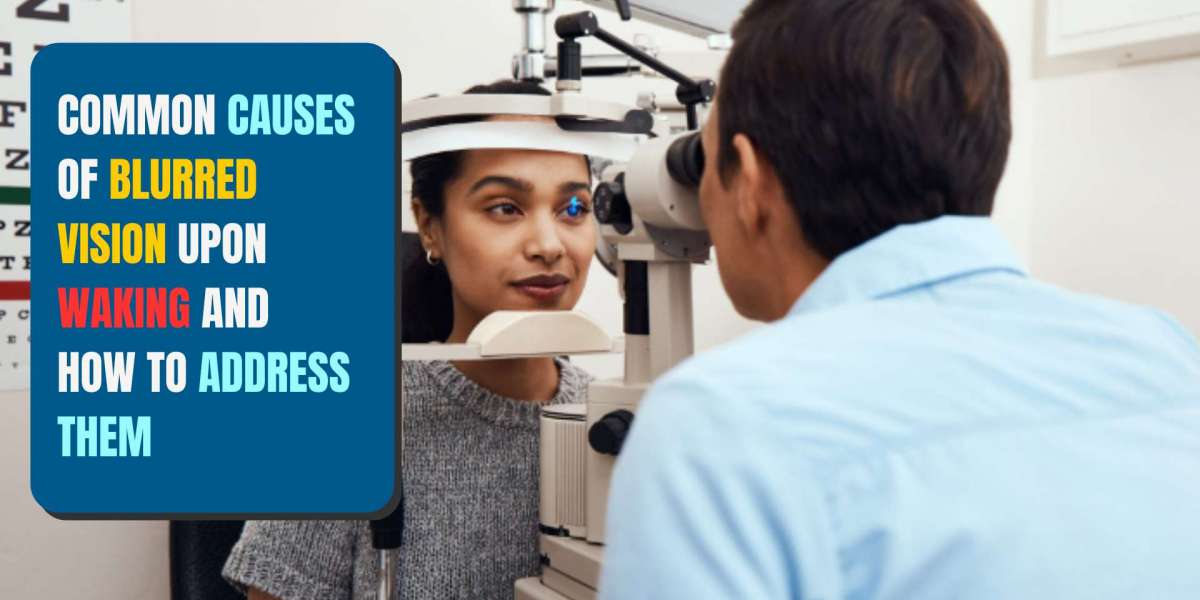Waking up to find the world a little fuzzy can be disorienting and concerning. Many people experience blurry vision on waking, a temporary blurriness that usually clears up within minutes. While this is common, understanding its causes and knowing when it might be indicative of an underlying issue is crucial.
Blurred vision in the morning can be caused by a range of factors, from dry eyes to more serious conditions. In this guest post, we will explore some of the most common reasons for blurry vision on waking, how to address them, and when to seek professional help to ensure your eyes stay healthy and your vision sharp.
Understanding Blurry Vision on Waking
Blurred vision refers to a lack of sharpness in vision, where objects appear out of focus or hazy. This can happen in one or both eyes and can be temporary or persistent, depending on the underlying cause. Experiencing blurry vision on waking is typically temporary, but persistent blurriness may suggest an issue that needs medical attention.
The first step in addressing blurry vision is understanding what may be causing it. Below are some common reasons why you might experience blurry vision upon waking.
1. Dry Eyes
One of the most common causes of blurry vision on waking is dry eyes. While we sleep, our eyes are closed for extended periods, and the production of tears slows down. Tears are essential for keeping our eyes lubricated and healthy. Without adequate lubrication, the surface of the eyes can become dry, leading to blurred vision in the morning.
Dry eyes are particularly common for people who sleep in air-conditioned rooms or environments with low humidity. Using fans at night or sleeping with your eyes slightly open can also exacerbate this issue.
How to Address Dry Eyes
If you suspect dry eyes are the cause of your blurry vision on waking, there are several ways to address this issue:
- Artificial tears: Over-the-counter lubricating eye drops can help alleviate dryness and improve morning vision.
- Humidifier: Using a humidifier in your bedroom can add moisture to the air, reducing the likelihood of your eyes drying out while you sleep.
- Eyelid hygiene: Clean your eyelids and lashes gently to remove any debris or oils that can contribute to dryness.
- Consult an eye specialist: If dry eyes persist, see an optometrist for professional advice and treatment options, such as prescription eye drops or punctal plugs.
2. Eye Fatigue and Digital Eye Strain
In today’s digital age, prolonged use of screens is a leading cause of eye fatigue, also known as digital eye strain. Spending hours on computers, smartphones, or other digital devices can strain your eyes, causing them to feel tired, dry, or irritated. This can result in blurry vision on waking, especially if you spent a long time on a screen the day before.
Eye strain may also be exacerbated by poor lighting, improper screen positioning, or a lack of breaks during screen time. The symptoms often include blurry vision, headaches, and dry eyes.
How to Address Eye Fatigue
To prevent eye fatigue from causing blurry vision:
- Follow the 20-20-20 rule: Every 20 minutes, take a 20-second break and look at something 20 feet away to reduce eye strain.
- Adjust screen settings: Make sure your screen is at eye level and adjust the brightness and contrast to comfortable levels.
- Reduce screen time before bed: Limiting screen time in the evening can reduce strain on your eyes and improve your vision in the morning.
- Use blue light filters: Consider using blue light blocking glasses or activating blue light filters on your devices, as blue light can increase eye strain and disrupt sleep.
3. Sleeping with Contact Lenses
Wearing contact lenses while sleeping can lead to blurry vision on waking. Contacts limit the amount of oxygen that reaches the cornea, causing dryness, irritation, and inflammation if worn overnight. This can result in discomfort and blurred vision when you wake up.
Even though some contact lenses are designed for extended wear, it is generally not recommended to sleep in them unless prescribed by your eye doctor. Over time, sleeping in contact lenses can increase the risk of eye infections and other complications.
How to Address Contact Lens-Related Blurry Vision
If you wear contact lenses, follow these steps to prevent blurry vision on waking:
- Remove contact lenses before bed: Give your eyes time to rest and breathe by removing contacts before sleep.
- Follow your optometrist’s instructions: If you wear extended-wear contacts, ensure that you follow your eye doctor’s recommendations for wear and care.
- Use lubricating eye drops: If you experience dryness after wearing contacts, use lubricating eye drops approved for contact lens wearers.
- Switch to daily lenses: If you frequently forget to remove your contacts, daily disposable lenses may be a more convenient and healthier option.
4. Eye Allergies
Allergic reactions can cause morning blurry vision. Eye allergies, also known as allergic conjunctivitis, can be triggered by allergens such as dust mites, pollen, pet dander, or mold. When you sleep, these allergens can accumulate on your pillowcase or bedding, leading to symptoms like redness, itching, and watery or blurry eyes upon waking.
How to Address Eye Allergies
To reduce allergy-related blurry vision on waking:
- Wash bedding frequently: Regularly clean your pillowcases, sheets, and blankets to remove allergens.
- Use hypoallergenic bedding: Consider using hypoallergenic pillowcases and mattress covers to reduce exposure to allergens.
- Over-the-counter antihistamines: If allergies are a common issue, antihistamine eye drops or oral medication can help alleviate symptoms.
- Limit exposure to allergens: Keep windows closed during high-pollen seasons and use air purifiers to remove allergens from the air.
5. Corneal Edema (Swelling)
Corneal edema, or swelling of the cornea, is another possible cause of blurry vision on waking. The cornea is the clear, outermost layer of the eye, and swelling can occur when fluid builds up. This may happen after long periods of sleep due to reduced oxygen levels to the cornea, especially in people with underlying eye conditions or those who wear contact lenses.
Corneal edema can also result from trauma to the eye, infections, or conditions such as glaucoma or cataracts. If you notice persistent or recurring blurry vision that doesn’t clear up within a few minutes of waking, it could be a sign of corneal edema.
How to Address Corneal Edema
If you suspect corneal edema, consult an eye doctor for diagnosis and treatment. Common treatments include:
- Saline drops: Saline eye drops may help reduce swelling and clear up blurred vision.
- Avoiding contact lenses: Refraining from wearing contact lenses until the condition resolves can prevent further irritation.
- Medical treatment: If corneal edema is caused by an underlying condition like glaucoma, your eye doctor will recommend appropriate treatments, such as medications or surgery.
6. Low Blood Sugar (Hypoglycemia)
In some cases, blurry vision on waking may be related to low blood sugar levels, especially in people with diabetes. Hypoglycemia occurs when blood sugar levels drop too low, which can lead to visual disturbances, including blurred vision. This is often accompanied by other symptoms such as dizziness, shakiness, and fatigue.
For people with diabetes, maintaining stable blood sugar levels is essential for overall health, including eye health. Blurry vision on waking may be a sign that blood sugar levels were unstable during the night.
How to Address Low Blood Sugar-Related Blurry Vision
To manage hypoglycemia-related blurry vision on waking:
- Monitor blood sugar levels: Regularly check your blood sugar levels, especially before bed and in the morning.
- Follow a balanced diet: Eating regular, balanced meals with a mix of carbohydrates, proteins, and fats can help stabilize blood sugar levels.
- Consult your doctor: If blood sugar fluctuations are frequent, consult a healthcare professional to adjust your treatment plan.
When to Seek Professional Help
While occasional blurry vision on waking is often harmless and temporary, persistent or recurring symptoms may indicate a more serious issue that requires medical attention. If your blurry vision lasts beyond a few minutes after waking, or if it is accompanied by other symptoms such as eye pain, redness, or headaches, it is essential to consult an eye specialist.
Conditions like glaucoma, cataracts, or retinal issues can also cause blurry vision and require prompt diagnosis and treatment to prevent long-term vision loss.
Conclusion
Blurry vision on waking is a common experience that can have various causes, from dry eyes and allergies to more serious conditions like corneal edema or diabetes. Understanding these causes and taking steps to address them, such as using lubricating eye drops, practicing good eyelid hygiene, or managing blood sugar levels, can help alleviate morning blurriness.
However, if you experience persistent blurry vision, it’s important to seek the advice of an eye care professional to ensure your eyes remain healthy and your vision sharp. By staying proactive about your eye health, you can enjoy clearer mornings and overall better vision.








